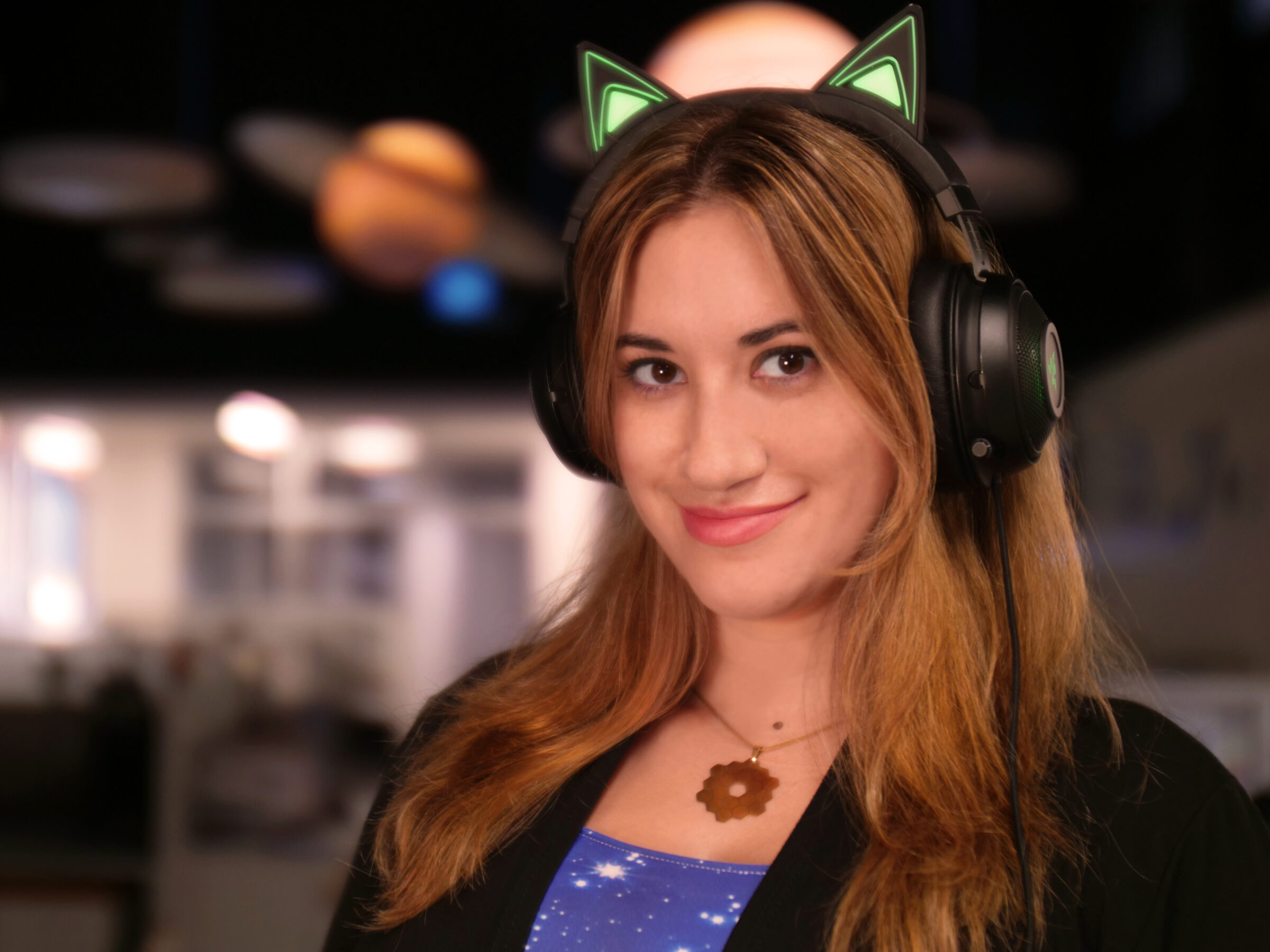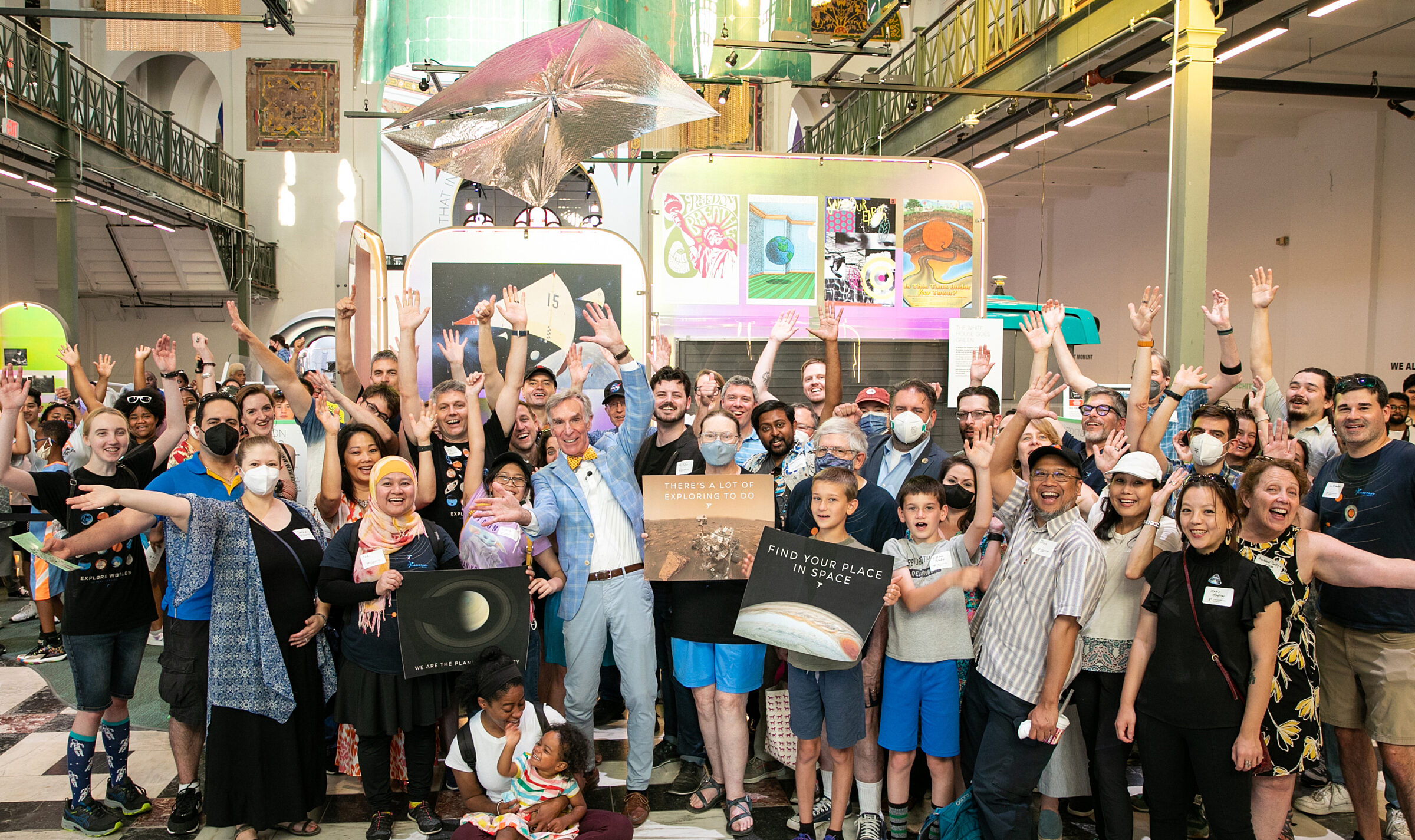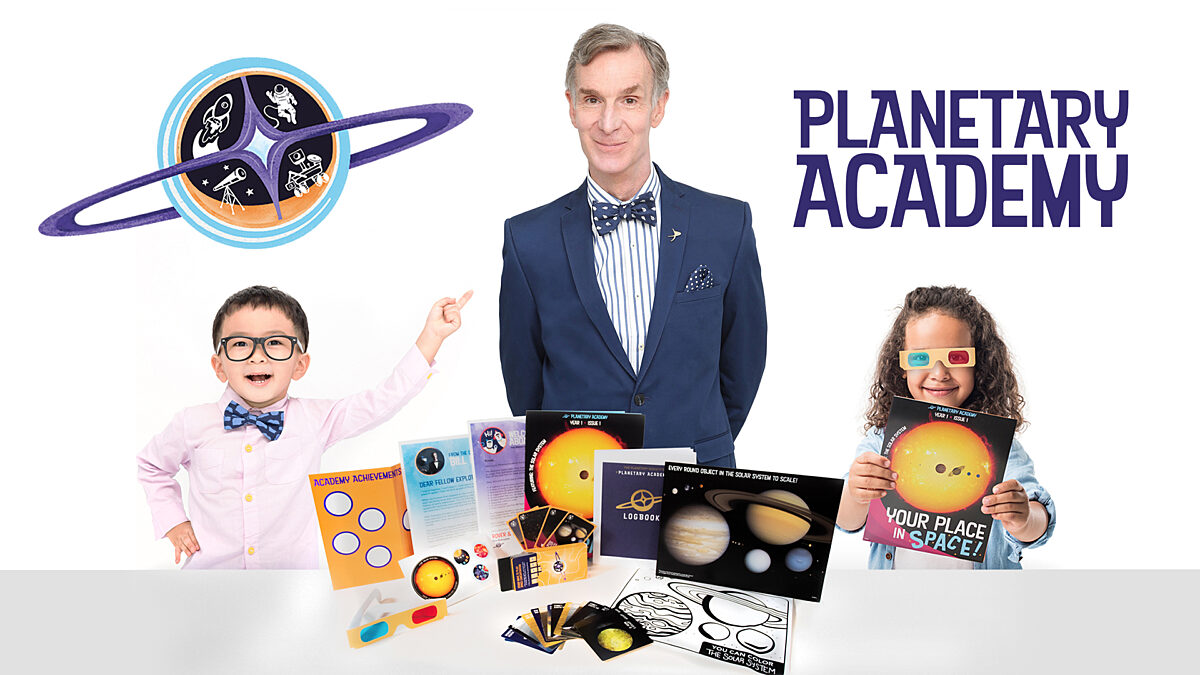The Planetary Society • Nov 24, 2022
2022 impact report
Together, we can do so much! In 2022, with the support of our 50,000 members, we had another outstanding year of advocating, educating, innovating, and collaborating to advance space exploration. Here we summarize some of the year’s highlights.
INNOVATION

A new STEP to support space science and technology
In 2022, The Planetary Society awarded the first-ever Science and Technology Empowered by the Public (STEP) Grants.
STEP Grants, funded by a generous donation from the Halicioglu Family Foundation, are a new grant program to support projects that help advance The Planetary Society’s core interests of exploring other worlds, finding life, and defending Earth from dangerous asteroids. The winners are chosen through an open, international, competitive proposal process.
We awarded two grants: $49,980 to a team from the University of California at Los Angeles led by Professor Jean-Luc Margot for a citizen science project focusing on the search for extraterrestrial intelligence, and $44,842 to a team from the University of Belgrade in Serbia led by Professor Bojan Novaković for a project that will develop a new way of characterizing the physical properties of asteroids.
We’re in the process of evaluating a new round of STEP Grant proposals, so expect an announcement of the next round of winners in the coming months.
Keeping eyes on the sky
Thanks to our generous members, we were able to award more money to more recipients than ever before to the winners of our Shoemaker Near-Earth Objects (NEO) Grant program, which supports very advanced amateur astronomers who help protect Earth from asteroid impacts by finding, tracking and characterizing NEOs.
The eight winners announced in February of this year were from seven countries on three continents and received funds totaling $74,375. Over the 24-year history of the program, approximately $515,000 has been granted to 70 winners in 21 countries on six continents.

Celebrating LightSail 2
In June, we celebrated the third anniversary of the launch of our LightSail 2 solar sailing spacecraft.
Operating far beyond its expected lifetime, LightSail 2 provided engineering data and stunning images for more than 18,000 orbits of Earth. In November, as expected, atmospheric drag brought the spacecraft down in a fiery burn-up in the Earth’s atmosphere.
Although the spacecraft is gone, the mission is not over. The LightSail team will carry out final mission analyses and share information through professional papers and presentations at conferences. And we will continue to stay in contact with the NASA missions that we have worked with sharing information — the missions that will carry on the legacy of the LightSail program in bigger and better ways.
Of course, we will continue through our various communications channels to keep you updated on the progress of the mission. The LightSail 2 mission and the LightSail program would not have been possible without the support of our members and donors. We are so proud of what we have been able to accomplish together.
ADVOCACY

Our annual Day of Action
On March 8, advocates around the world came together virtually in support of space exploration during our annual Day of Action.
In the United States, 115 Planetary Society members met with a total of 161 congressional offices to advocate for key NASA programs, including the NEO Surveyor asteroid-hunting space telescope, Mars Sample Return, and human exploration beyond Earth. A further 680 advocates wrote and called their representatives in the United States to echo the same key priorities, and advocates around the world shared key messages on social media to amplify the campaign’s signal.
The Day of Action is our largest annual advocacy event (and the largest of any independent pro-space organization), and the turnout gets better each year. Stay tuned for 2023's Day of Action.
Fighting for NEO Surveyor funding
In response to Planetary Society advocacy, both houses of the US Congress have proposed NASA budgets that restore tens of millions of dollars to the asteroid-hunting NEO Surveyor mission, which was to suffer a 75% cut. At the time of this writing, the Senate had proposed to restore $40M to the program and the House, $55M. Additional legislation passed into law directs NASA to avoid cutting NEO Surveyor in the future, even when facing overruns in other planetary science missions.
Establishing our commercial spaceflight policy principles
The Planetary Society’s board of directors and staff came together this year to establish a new set of space policy principles in response to a growing sector of the space industry: commercial spaceflight. This sector involves all companies that engage in space activities for profit as opposed to government bodies. It includes companies like SpaceX that provide launch services and vehicles for NASA and others, businesses like Blue Origin and Virgin Galactic that offer spaceflight experiences for private clients, and many others. The Planetary Society has outlined a set of principles that will guide our engagement to the activities of these companies, focusing on the potential benefits and risks that such activities could yield for scientific exploration of the Cosmos. Learn more at planetary.org/commercial-principles.
EDUCATION
Open up the Cosmos for the kid in your life!
When did you fall in love with space? Here at The Planetary Society, we think a lot about igniting the passion for space in explorers of all ages, and we think a lifetime love for space exploration can start as a child. This is why we have developed Planetary Academy, a 100% space-related membership designed for kids under 10 years old.
As a Planetary Academy member, young explorers receive four adventure packs per year developed by the educational experts at The Planetary Society. The first adventure pack includes a personalized welcome letter from Bill Nye, CEO of The Planetary Society; an official membership card to Planetary Academy; activity book; stickers; trading cards; games; and surprises.
Thanks to the overwhelming support of our members and backers, we were able to raise just over $115,000 on Kickstarter to get Planetary Academy off to a stellar start, with more than 800 new members joining the program! Our team has dreamed about launching a member program designed just for kids for many years, and we’ve been hard at work to make it happen this year. Thanks to you, this dream is now a full reality, and Planetary Academy is available to all.
Planetary Academy is made possible through the generous contributions of The Halicioglu Family Foundation, proud Planetary Society member Andrei Dunca, and thousands of Society members just like you.

A new era for Planetary Radio
After 20 years at the helm, our friend and colleague Mat Kaplan is retiring as the host of Planetary Radio — a show he started from scratch that now reaches more than 2.5 million listeners each year in more than 40 countries.
When Mat announced his retirement from the show earlier this year, The Planetary Society set out on an extensive search for a new host. We’re delighted to announce that Planetary Radio will be in excellent hands after Mat’s departure with new host Sarah Al-Ahmed.
Sarah is a talented science communicator informed by a professional background in astronomy and degree in astrophysics from the University of California, Berkeley, and several years at Griffith Observatory.
As for Mat, he will continue to work with The Planetary Society in a new role after he hangs up his headphones on Dec. 30, 2022, and he couldn’t be happier for Sarah or the show.
“The loyal Planetary Radio audience is about to discover someone who loves to share the PB&J of space — the passion, beauty, and joy — as much as I do,” he said. “I can't wait to see where she and our colleagues take us in this new era.”
Thank you, Mat, and welcome, Sarah!
Defending Earth! A Planetary Society Planetary Defense Update Protecting our world from the threat of asteroids and comets is a core enterprise at the Society, one that our members and supporters care deeply about. Chief scientist Bruce Betts will review our recent efforts and successes. Bruce and Planetary Radio host Mat Kaplan will also welcome Nancy Chabot, planetary scientist at the Johns Hopkins University Applied Physics Lab. Nancy is the coordination lead for NASA's Double Asteroid Redirection Test or DART. The DART spacecraft will slam into small asteroid Dimorphos on September 26, 2022. It will be humanity's first test of asteroid deflection.
Giving our members the inside scoop
Planetary Society members get special access to our thought leaders about developments in space through our quarterly webinars. This year, we kept members up to date on developments in space policy, asteroid defense, and solar sailing. If you missed them, this year’s webinars are available on our website:
Spring 2022 space policy update
Defending Earth! A planetary defense update
Three years in space! LightSail 2’s sail deployment anniversary celebration
The Downlink: A weekly space round-up for busy people
Throughout 2022 we continued to produce our popular weekly email newsletter, the Downlink. More than 22,000 people signed up to receive it in the past year! The Downlink is your toolkit to learn more about space, share information with your friends and family, and take direct action to support exploration. Anyone can subscribe at planetary.org/connect to receive it as a weekly email.
The ZED Factor Fellowship
The Zed Factor Fellowship aims to empower and engage aspiring aerospace professionals from underrepresented backgrounds through hands-on, practical experiences working and contributing to the leading companies of the aerospace community. Fellows bring their unique backgrounds and perspectives, as well as technical skills, to a community that enables them to reach for the stars.
COLLABORATION

Sharing space in the community
Space exploration is an international endeavor, and the things that we discover about the Cosmos and our place in it are meant to be enjoyed and appreciated by the whole world. That’s why The Planetary Society partners with global organizations and events that share space with people all around our planet.
With the gradual return of in-person events, The Planetary Society was able to collaborate with like-minded organizations to share the passion, beauty, and joy of space with in-person audiences. In 2022, The Planetary Society partnered with Yuri’s Night; Explore Mars and their Humans to Mars Summit; AstroFest 2022 in Pasadena, CA; the Astronomy Festival on the National Mall in Washington, D.C.; World Space Week; and International Observe the Moon Night.
Making an impact for planetary defense
This year we continued our international work in pursuit of protecting our planet from dangerous asteroids and comets.
In May, Society leaders participated in an international conference titled “Apophis T-7 Years: Knowledge Opportunities for the Science of Planetary Defense,” which dealt with preparations for the close approach of asteroid Apophis in 2029. Chief Communications Officer Danielle Gunn led a presentation about communications best practices to help asteroid researchers better convey their work and its importance to the public and to decision-makers in government.
In June, we partnered with Asteroid Day, a UN-sanctioned global series of events celebrating asteroid research and raising public awareness of the asteroid threat. This year’s event involved in-person activities as well as a live-streamed video event for audiences around the world.
In September, some of the world’s leaders in planetary defense came together at the 2022 International Astronautical Congress in Paris, France, for a panel called “Defending Earth: The International Effort to Protect Us From Asteroids and Comets.” The panel was moderated by Planetary Society board member Dipak Srinivasan, and joined by our CEO Bill Nye who shared ideas for how to get the public more fully engaged in planetary defense.
Star Trek's George Takei: "Boldly go together to build our future." George Takei played Sulu on Star Trek, a show that looked to the future with optimism. Now he's helping make the future that Star Trek represents a reality.
Star Trek stars come together to support The Planetary Society
Inspired by our mission, this year more legends from across the Star Trek universe shared their passion for space and belief in our vision. This year George Takei and John de Lancie recorded their support for The Planetary Society, joining videos by Kate Mulgrew, Tim Russ, and Robert Picardo.
As Robert Picardo put it, in a blog written shortly after joining the board of The Planetary Society, about the late, great Nichelle Nichols, who in 2016 recorded her own video in support of The Planetary Society, “I hope to join Nichelle and promote the message that, if you love Star Trek, you love space exploration and science.”
Space for everyone
Over the last two-and-a-half years, The Planetary Society has taken on a course of internal work to improve our diversity, equity, inclusion, and accessibility (DEIA) practices. DEIA has been woven into our day-to-day operations thanks to the creation of a working group within our staff and a committee on our board. We have conducted training sessions for all of our staff as well as our board to learn more about DEIA and to dig into how we can improve what we do here at the Society. We are committed to working hard to ensure that everyone is welcome in our organization at every level, from members and supporters to staff, volunteers, and board members. This is ongoing work, and we appreciate the support of our members as we all learn and grow as individuals, a team, and a global community. To reflect this commitment, we have added inclusion to our organizational core values.
THANK YOU!
None of this work would be possible without the support of our members. Thank you for making 2022 such a great year!
The Time is Now.
As a Planetary Defender, you’re part of our mission to decrease the risk of Earth being hit by an asteroid or comet.
Donate Today

 Explore Worlds
Explore Worlds Find Life
Find Life Defend Earth
Defend Earth



